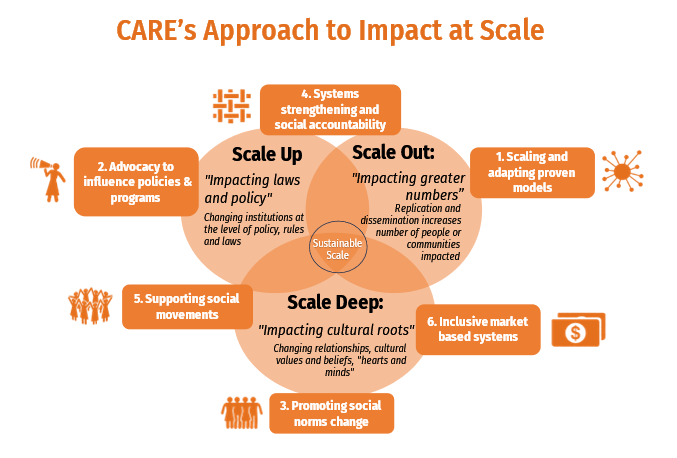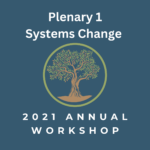By Jay Goulden ([email protected]) and David Leege ([email protected])
How does an international NGO like CARE contribute to sustainable, systemic change at scale, far beyond the direct work we and our partners carry out with communities? That is the challenge we’ve put at the heart of our new 10-year strategy. Drawing on learning from within CARE’s programs and within the wider scaling up community, we have also developed a new guidance note (EN,FR,ES) outlining six pathways to Impact at Scale. These pathways are framed around Riddell and Moore’s three approaches of scaling up, scaling out and scaling deep.
The first is the perhaps traditional pathway of scaling up and adapting successful models, within CARE’s own programs and with and through others, such as in our savings group scale-up strategy. Our second pathway is advocacy to influence the policies, budgets or programs of government or other power-holders, an approach we have already seen as contributing over half of CARE’s global impact numbers. As an organization focused on gender equality, the third pathway is on promoting social norms change, both to trigger change at scale but also to ensure that work through other pathways leads to deep changes in gender-inequitable social norms, without which progressive policies remain unimplemented or scaled up models can just scratch the surface. CARE and our partners’ work challenging norms around masculinity in the Balkans shows the importance of this pathway to complement work to scale up models or influence government guidelines. Systems strengthening is the fourth pathway, ensuring the wider capacities and systems within Government or others within which policies can be implemented or models scaled up, in an accountable way. CARE India’s health program in Bihar demonstrates well the need for working with Government to ensure improved infrastructure, equipment and increased staffing in health facilities, and stronger data systems to track progress, to complement the scaling up of innovative models. Weldon and Htun have proven how critical feminist movements are for gender equality policies, and CARE’s wider learning on strengthening social movements shows this is a critical pathway for changes in gender equality at scale. Finally, making market systems more inclusive, beyond individual private sector partners with whom we work, can be another important pathway for inclusive change at scale.
The guidance note outlines a number of examples from CARE’s programs at global, regional or national levels, that apply different combinations of these pathways, such as the Multilingual Education Program in Cambodia. It also highlights learning from others, including such as MSI’s Scaling Up Management framework, WHO’s ExpandNet, IDIA’s insights on scaling innovation and principles, and The Learning Collaborative to Advance Normative Change’s work on scaling up norms-shifting interventions.
Any feedback or reflections from the Scaling Community of Practice would be hugely welcome: please contact Jay Goulden ([email protected]) or David Leege ([email protected]) for further information.



